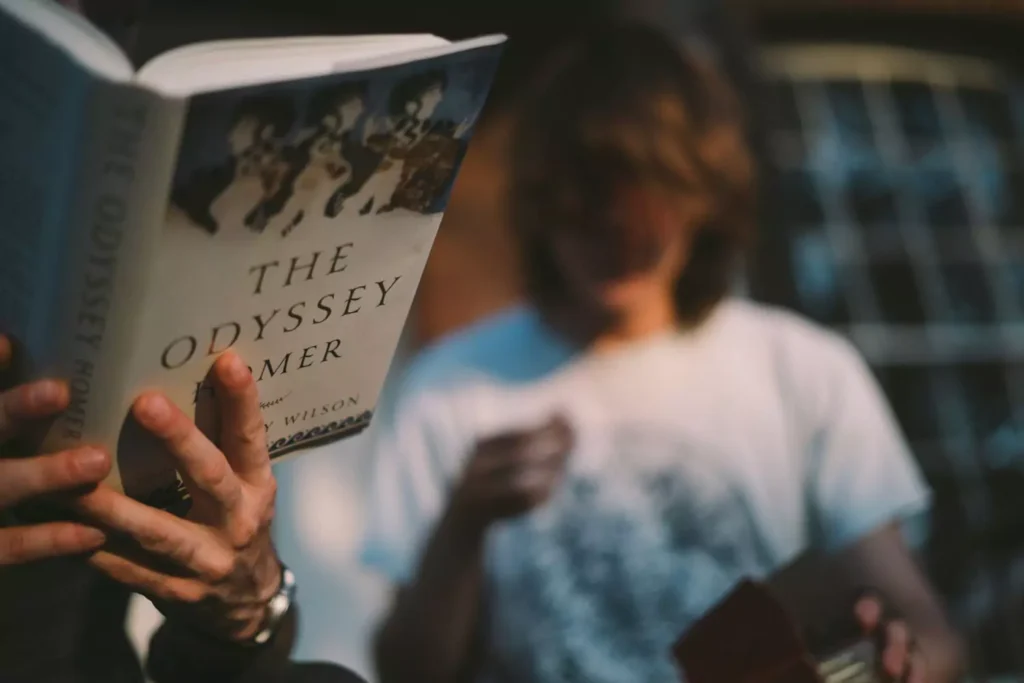Why do people today read “Pilgrim’s Progress”? Why do “Frankenstein,” “The Odyssey” and “A Tale of Two Cities” still sell truckloads of copies? Because certain books impact generation after generation for decades — or even centuries — after they are written.
Scholars, critics and others call such books the Great Books. In addition to standing the test of time, these notable works are considered great because of their storytelling, ideas, and far-reaching cultural impact — for good or bad.
The modern assumption is that newer tends to be better. Our attention is captured by the “fresh” and cutting-edge. We are attracted to the breaking story and the novel idea. We live under a daily information avalanche that falls upon us through our digital devices. Newer may be better in medicine and technology, but I’d argue we need something time-tested and proven when it comes to dispensing truth, virtue and imagination.
When you read one of the Great Books, it’s like discovering a towering oak tree in a field of saplings. Perhaps it is unexpected and intimidating at first; however, you’re intrigued to uncover what is it about this tree that has made it endure. There’s something there worth finding.
The same is true of literature. I invite you to join the Great Books tradition. This tradition was established for good reasons, and you will soon discover why the works in it earned their place.
Three reasons to read Great Books
Social media provided the platform for the influencer economy to balloon into a giant industry. Unfortunately, “influencers” tend to be heavy on charm but light on wisdom, and at the end of the day little more than an ad agency for large brands.
You deserve to have your intellect, imagination and affections influenced by something much better. Here are three reasons to give more attention to the Great Books.
1. Great Books will give you wisdom for life.
I’ve gone on a few hiking trips with my Blue Heeler, Cosmo. We’ve learned the simple rule that hiking goes much more smoothly when you stick to the trail; without a trail, we’d quickly become disoriented and lost. I love thinking about all the people who came before us to develop that trail. Once, we encountered a beautiful wooden bridge miles into the woods, far from any roads or shelter.
Reading the Great Books is like taking the well-worn trail through the forest. They show you the wisdom that has successfully guided generations upon generations.
The wisdom that comes from reading Great Books will better equip you to navigate life. Tertullian’s “Apology” shows us how he defended Christianity in pagan culture. Augustine’s “City of God” includes some of the most robust answers to the problem of evil that have ever been written. The Puritan writers teach us how to handle doubts, guilt and temptations.
2. Great Books will grow your heart and your mind.
Many of us are hesitant to read old books because they are challenging. They are often written in different time periods, cultures or languages. But every time we take a step outside of our comfort zone, we are growing into better versions of ourselves.
First, Great Books will sharpen your intellect. They require more thinking because of their complex ideas — such as those of Plato, Aquinas or Nietzsche. More often, they are difficult because they are simply different. They pull us out of the echo chamber of our modern, digital-dominated world into something unlike our experience. Books from different time periods will have different assumptions, values and linguistics. If you allow yourself to be stretched by reading from Great Books, then you’ll find your worldview clarified. You will become someone who can handle challenging ideas and be unintimidated by them.
For example, I have never met someone who believes that slavery is good, but I have read people who argued for it. Reading their viewpoints and arguments, which I deem evil, have sharpened my thinking as I defend my disagreement with them. That’s an experience that is only available through reading such books.
Second, reading Great Books will grow your sympathy for others, as well as appreciation for the many factors that shape who we are as persons. The most obvious example is in classic literature that gives us a window into another person’s life. The Japanese classic “Silence” is a book not about heroes of the faith, but the defeated. The author Shusaku Endo wrote, “Christ did not die for the good and beautiful. It is easy enough to die for the good and beautiful; the hard thing is to die for the miserable and corrupt.” The reader experiences the power of this quote through the repeated failures of Kichijiro. You’re compelled to admit that you identify with him more than you’d like, and you develop sympathy for those like him.
3. Great Books will develop your virtues.
If you read the Great Books primarily for self-improvement, you will most likely hate them. Your primary goal should be enjoyment of the texts before anything utilitarian. The trick to enjoyment is to align your goals for reading with the author’s purpose for writing. You should approach Mark Twain and Jane Austen to delight in the story before directing to them for moral insight. If you read C. S. Lewis or Dante because you hear smart people quote them and you just want to be smart too, it will dwindle your appreciation for their works.
The beauty of reading the Great Books is that they will develop your virtues through your enjoyment of the text. After all, they are considered great for a reason. Like a steak absorbing the flavors of a marinade simply by sitting in it, when we soak in the magnificent works of Augustine, Shelley, Bunyan, Dickens, Tolkien and others, we will absorb their lessons.
You will also grow in your intellectual virtues. Not all the Great Books are difficult to read, but many of them will challenge and stretch you. You will develop your reading comprehension, sharpen your critical thinking, and hone your focus. If you initially struggle to read the Great Books because you’re not yet at the reading level required, don’t give up. With consistent effort and patience, you will gain the skill to handle them.
Moreover, you will develop your moral virtues. The stories we read shape our imagination similar to how the foods we eat shape our physical health. The Great Books you read will shape your imagination with stories — or teachings — that extol virtues such as integrity, perseverance and courage. Part of the reason many of these books are in the Great Books tradition is because they teach these moral lessons so well. The positive examples of Tolkien’s Bilbo and the dwarves will inspire self-sacrifice and honor. The negative examples of Shelley’s Dr. Frankenstein or Wilde’s Dorian Gray will vividly warn you of the dangers of arrogance.
Join the tradition!
Ready to get started? You will not regret the time and effort you put into reading the Great Books. Here are a few pieces of practical advice for beginning your journey.
First, begin with the easier books. Recognize your reading level and start with something appropriate. Fiction tends to be easier than non-fiction, and the books that were written more recently will usually be easier than the older works. For example, start by reading the best books of the 19th and 20th centuries and then move your way backwards in history. In fiction, this includes titles such as The Chronicles of Narnia series or Jane Austen’s books. In non-fiction, read John Stott or Francis Schaeffer before you attempt to take on theologians like Calvin and Luther.
Second, find a helpful list and ask for suggestions. It isn’t difficult to find Great Books lists with an online search. I would recommend the list in the Great Books class that I teach. Blogger Tim Challies has a list of Christian classics you can choose from to get ideas. You can also take advantage of online communities like Goodreads to see what others are reading and what lists they have made. Finally, you can ask for recommendations from your pastor or a favorite teacher. If they don’t have any suggestions, share this article with them.
We critically need more people today who are influenced more by the Great Books than by the vain “influencers” and celebrities of our contemporary world. The beauty of the Great Books tradition is that it is a tradition. This means that if you participate, then you are joining a big community of people going back through history.
Moreover, if you join the tradition, you are someone who can steward and carry on the tradition by sharing it with others. “Finally brothers and sisters,” wrote the Apostle Paul, “whatever is true, whatever is honorable, whatever is just, whatever is pure, whatever is lovely, whatever is commendable — if there is any moral excellence and if there is anything praiseworthy — dwell on these things” (Philippians 4:8, CSB).
Copyright 2024 Aaron Shamp. All rights reserved.











